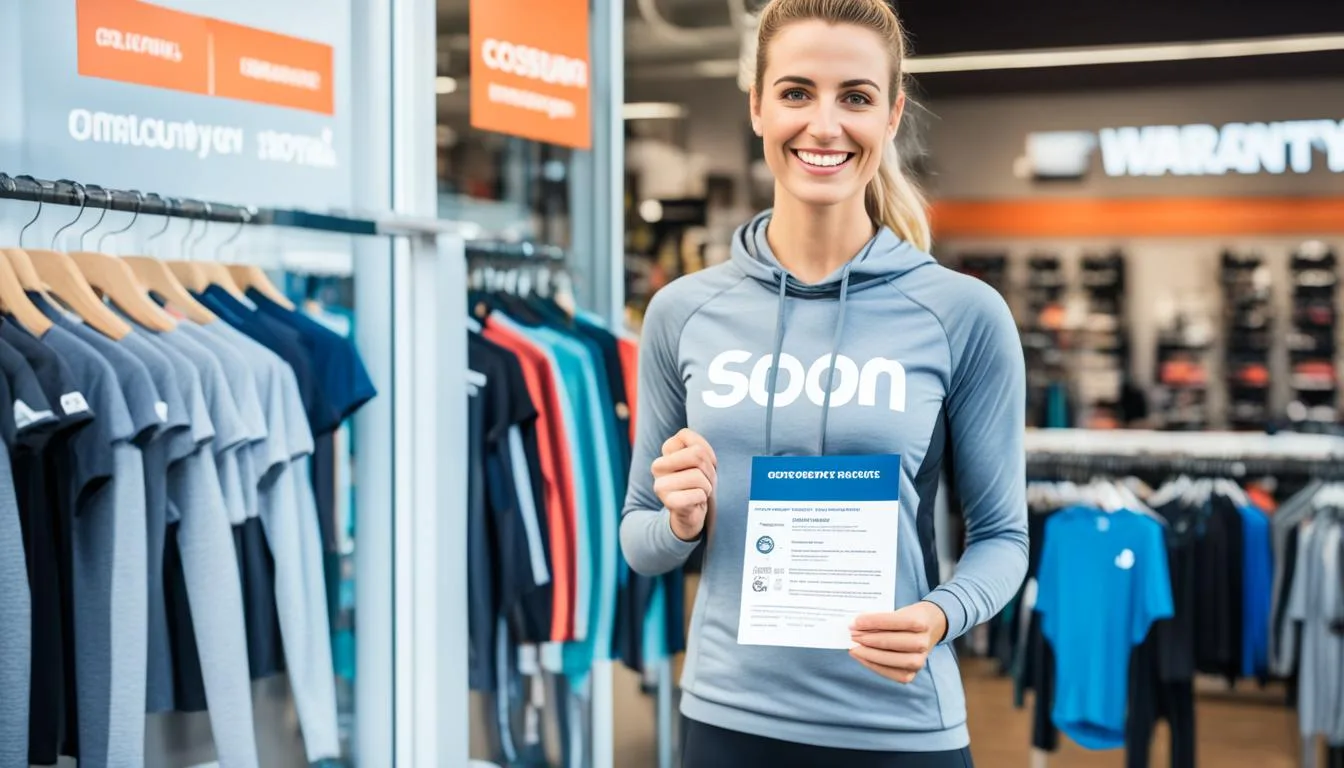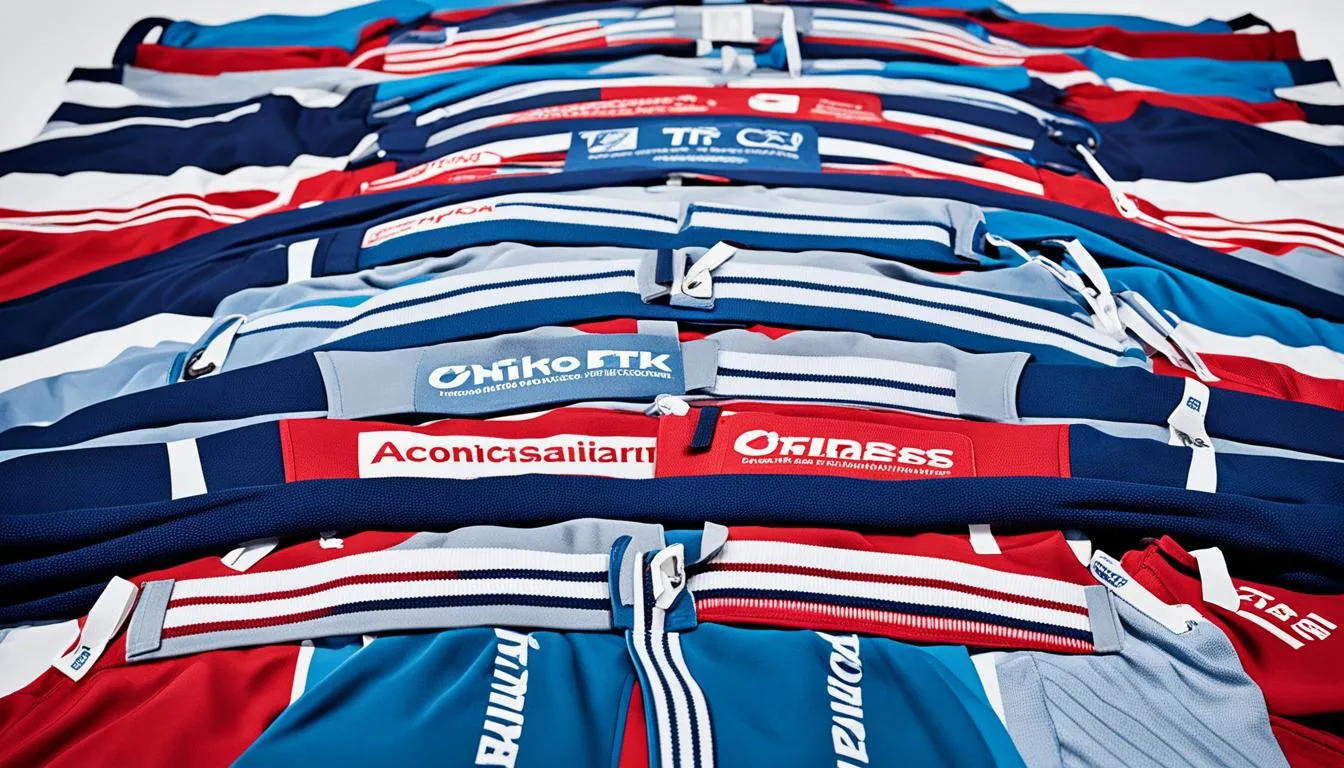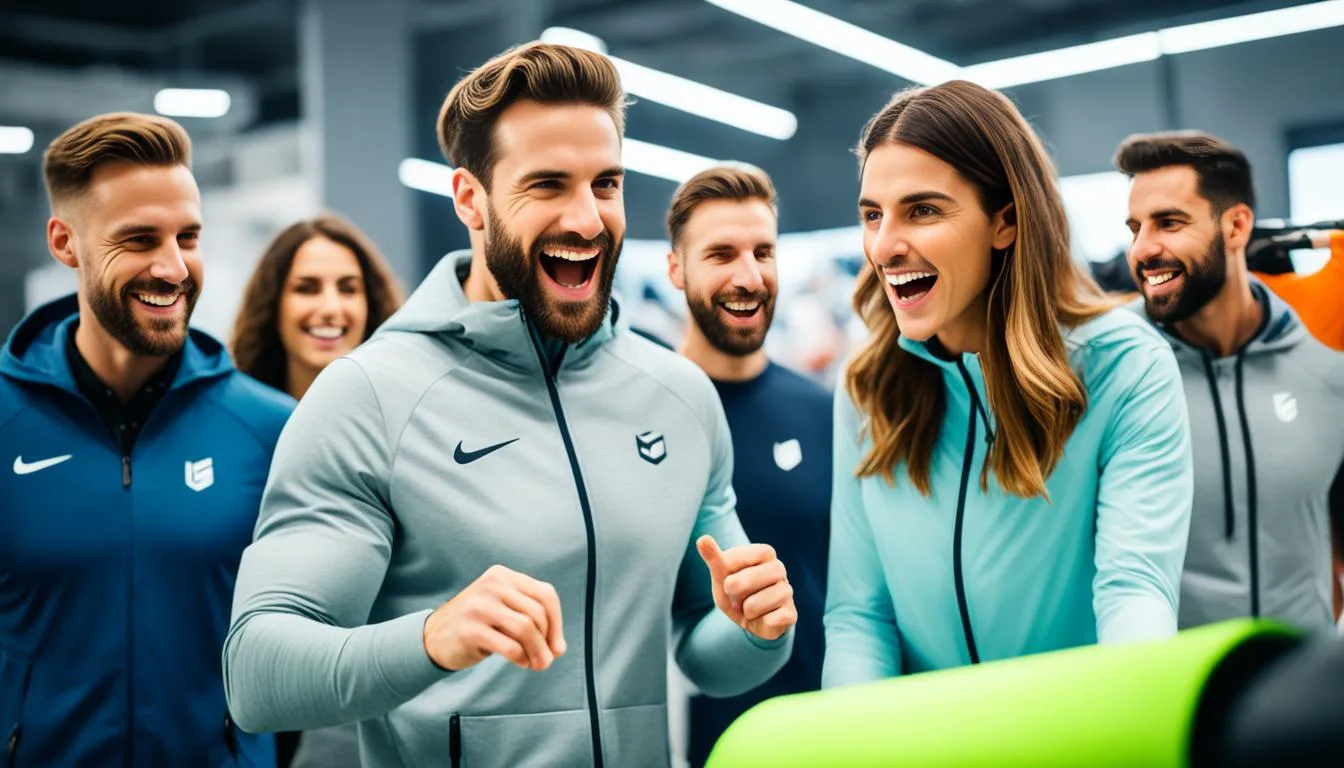The Role of Sustainability Certifications in Sportswear Marketing
Connect With Us Today
Consider us for your next production run. Why wait? Send us your questions here.
We’re in a time where sustainable fashion matters more than ever. Our journey towards greener marketing has brought us to an important step: getting sustainability certifications. These marks show a brand’s commitment to being kind to the environment through its products and how they are made. In a world where both big and small sportswear brands are trying to do better for our planet, these certifications are key.
The way we see sustainable fashion is changing, just like the sportswear industry’s approach to being green. Nowadays, consumers want to see real action, not just talk. They want brands to work with them to make a difference. Our model helps brands grow their green efforts. It’s based on what we know about the market and its shifts, especially how eager Gen X shoppers are to spend on sustainable products.
Key Takeaways
- Adopting sustainability certifications is critical for enhancing brand trust and ensuring ethical branding in the sportswear industry.
- Eco-friendly marketing benefits from transparency, with certifications acting as a testament to a brand’s commitment to environmental stewardship.
- Understanding consumer trends, such as the increased willingness of Gen X buyers to pay a premium for sustainability, is vital for targeted marketing.
- By focusing on partnerships that extend beyond traditional business models, brands can foster ongoing sustainable impact alongside their customers.
- Real-world examples of sustainability in action, like zero-waste arenas and renewable energy in sports venues, underline the tangible benefits of these certifications.
Understanding Sustainability Certifications in the Sportswear Industry
In the sportswear industry, we know how important sustainability is to buyers. Sustainability certifications show a brand’s true colors in social and environmental care. From how items are made to when they reach the shopper, every step offers a chance for brands to prove their eco-friendly actions.
Diverse Eco-labels and Their Impact on Brand Transparency
Eco-labels help sportswear companies show they care about the planet and its people. Brands like Adidas and Patagonia use these badges as proof that their clothes are made right. This builds trust with customers who care about where their clothes come from and how they’re made.
Exploring the Types of Sustainability Certifications
The variety of sustainability certifications in sportswear is vast and changing. Certifications look out for animal rights and check how recycled materials are used. They also ensure workers are treated fairly and trade is just. This pushes fashion to be more responsible.
| Certification Type | Focus Area | Industry Leaders |
|---|---|---|
| Global Recycled Standard (GRS) | Recycled Material Lifecycle | Patagonia, Lululemon Athletica |
| Organic Content Standard (OCS) | Organic Material Sourcing | Adidas, Puma |
| Responsible Down Standard (RDS) | Animal Welfare | Nike, Puma |
These certifications have a big impact on the economy of the sportswear world. They matter to both huge companies and newer ones. Seeing a demand for sustainable clothes tells us that how a product’s made matters to buyers.
Sustainability Certifications as a Marketing Tool
In the world of green marketing strategies, sustainability certifications stand out. They show a company cares about the environment and help it stand out. Many sustainable fashion brands use these certifications to show they are serious about being eco-friendly. This helps them in the market and makes our planet better.
B Corps set a high standard for businesses. They believe businesses should help people and the planet, not just make money. When a company doesn’t meet B Corps’ standards, people notice. It tells everyone that the company isn’t living up to its promises.
We’ve seen how important B Corp status is. Brands like Patagonia show that being B Corp helps them keep their promise to be good for the world. It builds trust with customers and everyone else.
But, it’s important for people to learn what these certifications mean. Companies like Eileen Fisher tell their customers about it. This helps people know they are supporting companies that do good things for society.
- Now, more than ever, people want to buy things that are good for the environment. 90% of Gen X consumers are willing to pay more for such products. This has grown a lot in just two years.
- In sports, sustainability is also becoming important. The Forest Green Rovers are working to make their stadium the greenest in the world. It’s great for the planet and the game.
- Places like the Golden 1 Credit Union Center in Sacramento are setting new records. They’ve proved that being eco-friendly can also save money and make fans happy.
Places like Petco Park and State Farm Arena are making sports greener. They use solar power and reduce waste. This saves money and is better for the planet. Seattle’s Climate Pledge Arena also uses renewable energy. It’s a leader in green efforts in sports.
There are great examples of progress, but it’s tough to make all sports eco-friendly. Travel for sports can harm the environment. Still, Formula 1’s plan to be carbon neutral by 2030 shows the sports world is trying to change. They are using green marketing strategies and taking real steps to be more sustainable.
The Benefits of Eco-Friendly Marketing in Sports Apparel
Sports apparel is moving towards eco-friendly marketing. Brands now include sustainability certifications in their products and stories. This shows their care for the environment and boosts their image and customer loyalty. This change matches the growing demand for ethical branding and planet care. Let’s explore how this shift is changing the industry.
Bolstering Brand Image Through Environmental Certifications
Eco-certifications make a brand’s image shine in sports apparel. Bluesign®, Global Recycled Standard, and GOTS Certification show a brand’s eco-commitment. They prove activewear can be both stylish and made with care. Patagonia leads with its eco-friendly practices, showing the benefits of green marketing.
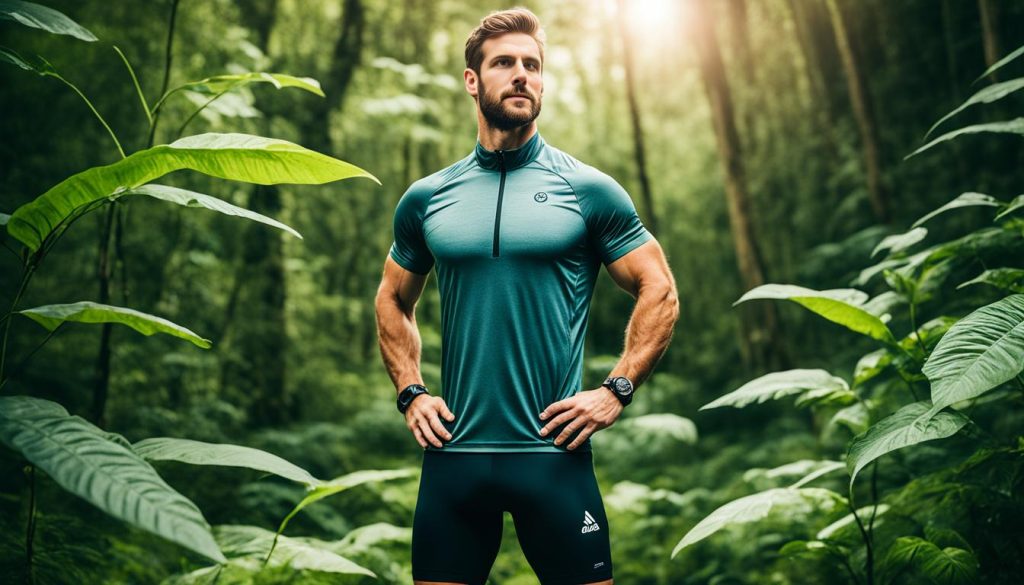
Consumer Trust and Loyalty Fostered by Ethical Branding
People now want ethical sports apparel. It’s more than a trend; it’s a deep shift in consumer thinking. When we market with these values, we earn trust and loyalty. Data shows consumers favor brands with clear eco-certifications, gaining a loyal following.
Considering a product’s entire life – from making to disposal – lowers its environmental effect. Brands that do this improve their image, earn trust, and protect our planet for future generations.
Case Studies: How Top Sportswear Brands Leverage Certifications
We’re exploring the impact of sustainable fashion and sportswear branding. It’s all about how brands lead with eco-friendly marketing. They use sustainability certifications to win over consumers and spearhead environmental progress.
The NFL sees about 35 tons of waste per game. The need for green solutions is urgent. The Atlanta Hawks’ State Farm Arena is a success story. It now diverts over 90% of its waste, improving from just 10% in 2019.
Then there’s the Golden 1 Credit Union Center in Sacramento. It’s the first to bag a LEED Platinum certification, leading in eco-friendly sports architecture. The Climate Pledge Arena in Seattle is also impressive. It’s powered entirely by renewable energy, setting a benchmark for carbon-neutral building.
Baseball’s stepping up too, with Petco Park in San Diego. The home of the Padres installed solar panels, looking to save around $4 million. This shows how being eco-friendly can also mean being financially smart.
“We recognize the power of sustainable sportswear branding, and by uniting with our eco-conscious customers, we pave a new path towards impactful and lasting change.” – Insight from sportswear industry leaders.
Formula 1 has set a goal to be carbon neutral by 2030. It’s a big aim for a global sport. Meanwhile, Gen X’s interest in sustainable products jumped from 34% to 90% in just two years. This marks a big shift in what consumers want.
Sustainability is now central to leading sportswear brands. Their approach to eco-friendly marketing and green operations shows. Certifications are not just awards; they guide the industry towards a greener future.
Sportswear branding is evolving with consumer needs. Healthy and sustainable options like Minute Maid Vita Punch and POWERADE® POWER WATER are in focus. Sustainability makes brands stand out, telling stories that resonate with eco-aware consumers.
Looking into these companies’ efforts reveals a key message. Promoting sustainable fashion and getting sustainability certifications do more good than we realize. They not only help our planet but also build strong bonds with eco-conscious customers. This shapes a legacy of brands that make a real, positive impact.
Evaluating the Credibility of Environmental Certifications
In sportswear marketing, environmental certifications are gaining importance. Through detailed study, we see a rising focus on eco-friendly marketing by consumers. To truly understand the effect of green marketing, we must examine the real value and strict standards of these certifications.
Audit Process and Certification Standards
The audit process is key to proving a certification’s worth. Groups like NSF International rigorously check for compliance with high standards. Among these are the Recycled Claim Standard and the Global Recycled Standard. This proves companies are genuinely aiding environmental sustainability, not just claiming to.
Consumer Perception of Certification Authenticity
Customers believe in brands that show a true commitment to saving the environment. They prefer brands that are honest about their eco-friendly marketing. This is backed by trustworthy sustainability certifications. This kind of trust grows when brands consistently prove their dedication to sustainability.
The Higg Index by the Sustainable Apparel Coalition is a good example. It measures the environmental and social impact across a brand’s entire value chain.
A model that held the sustainability of 16 Summer and Winter Olympic Games under scrutiny discovered a mean sustainability score of 48 out of 100, indicating that the reverence for environmental certifications is not just industry-specific but universal in its urgency.
In the arena of green marketing strategies, our goal is to raise the bar. We want to push for total openness and responsibility. By helping sportswear brands be better, we are part of a broader move towards a sustainable and fair future.
Green Marketing Strategies in the Athletic Wear Sector
The athletic wear sector is leading in eco-friendly marketing. It uses green marketing strategies to attract customers who care about sustainability. This approach is powerful, with US consumer spending over $14 trillion yearly. This spending is a big part of the US economy. For sports apparel brands, having sustainability certifications is crucial.
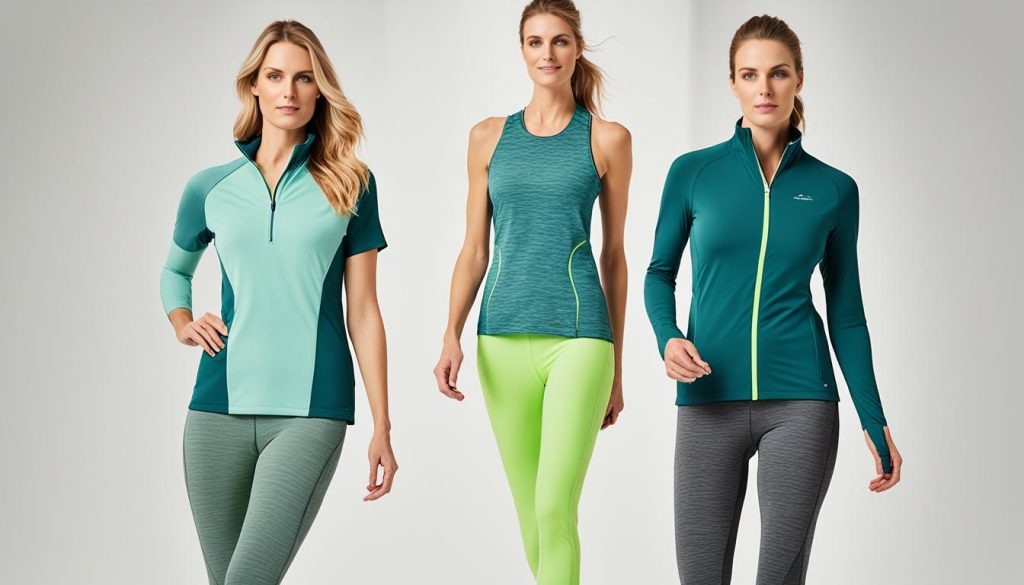
Today, customers want accountability and eco-friendly products more than ever. A 2020 McKinsey survey found over 60% would pay more for sustainable packaging. This shows the athletic wear sector is key in promoting green initiatives.
Incorporating Sustainability into Brand Messaging
Now, 78% of US consumers want to live sustainably. Successful brands connect with these consumers through eco-friendly marketing. They share real stories about their environmental efforts. This approach can lead to a 1.7% higher growth rate annually compared to brands that don’t make these efforts.
Case Example: Engaging Campaigns and Consumer Education
The Better Cotton Initiative teaches farmers about sustainable practices. This makes complex standards easier to understand. Their approach helps products with ESG claims. These products have seen 56% of all growth in the last five years. They also grew 28% in total, 8% more than products without the claims.
| Key Metric | Statistic | Impact on Athletic Wear Sector |
|---|---|---|
| Total US Consumer Spending | $14 trillion annually | Foundation of market potential |
| Importance of Sustainable Lifestyle | 78% of US consumers | High consumer value aligns with sustainability in branding |
| Willingness to Pay More | 60% for sustainable packaging | Consumer readiness to invest in green products |
| ESG Product Growth | 56% of past five years’ growth | Confirming consumer preference for ESG claims |
| Consumer Demographics | Higher-income, urban and suburban residents, households with children | Target demographics likely to engage in sustainable purchases |
Targeting specific groups, like wealthy families and city residents, is key. Athletic wear brands use this info to shape their green marketing strategies. They ensure their products not only look good but also show deep environmental commitment.
The Role of Sustainability Certifications in Sportswear Marketing
The sportswear industry is working through a tricky situation with over 400 voluntary sustainability standards. These standards focus on serious matters like fair pay, labor rights, health safety, and equality for all. They show how important social standards are within the global supply chains.
Second-party audits, like those by the Ethical Trading Initiative in Europe, confirm an organization’s commitment to these values. This was clear when, in 2003-2004, big companies showed they followed these sustainability standards. This was a big moment for green marketing strategies.
The journey of environmental certifications started in the 1940s and 1950s. It grew through fair trade shops in Europe and North America. By the 1970s, the fair trade movement had reached the food industry, beginning with coffee and tea and then moving to more products.
The first Fairtrade label in 1988 and the Rainforest Alliance in 1989 are key moments in these standards’ history. For instance, the Naturland Fair standard mixes organic farming with social responsibility. The FiBL’s WeCare program focuses on being eco-friendly and socially responsible. Together, they push The Role of Sustainability Certifications in Sportswear Marketing forward.
Since 2010, there have been way more sustainability certifications than in the past. These reflect the rise in consumers who care about these issues. They are now key in promoting sportswear, marking a new phase in green marketing strategies in the industry.
As market players, we see the big impact of this change. Adopting thorough sustainability practices backed by strong certification is essential. It’s not just a trend; it’s a must for today’s eco-focused consumers. The sportswear sector needs to keep up with these changes. This will secure their place in a future where caring for the environment is standard.
Challenges and Considerations for Sustainable Fashion Labeling
Exploring sustainable fashion labeling reveals a challenge. It aims to boost brand and ethical branding value. Yet, we must tackle issues like greenwashing. This can hurt consumer trust in sustainability certifications. Brands should ensure their eco-friendly marketing truly matches their sustainable efforts.
The shift in consumer sentiments toward sustainability in fashion post-pandemic is clear. Now, 67% of shoppers give more importance to the use of sustainable materials. This marks a change towards more mindful shopping.
According to data, 57% of consumers are living more eco-friendly to lessen their impact on the environment. This includes more than recycling. For instance, 60% are spending less on fashion now. Young people, especially Gen Zers and millennials, are leaning towards more budget-friendly options.
| Consumer Behavior | Percentage |
|---|---|
| Important to Limit Climate Change Impacts | 66% |
| Consumers Making Lifestyle Changes | 57% |
| Purchasing Products in Eco-friendly Packaging | 60% |
| Sustainable Materials as a Purchasing Factor | 67% |
| Brand’s Sustainability Promotion as Important | 63% |
| Planning to Purchase More Durable Fashion Items | 65% |
| Willing to Repair Items to Prolong Usage | 57% |
Data highlights how crucial a brand’s role in social and environmental issues is, with 63% of shoppers seeing sustainability promotion as key. Trust is vital for consumers; 70% stay with brands they trust during tough times. Also, 75% say trustworthiness is essential when buying.
As experts, we need to use these insights carefully. It’s important for sustainable fashion brands and their marketing to truly reflect their ethical values. This builds trust and attracts customers who value ethics as much as we do.
The Influence of Ethics and Sustainability on Consumer Behavior
Nowadays, the way we shop is changing because we care about the planet. Many people in the Asia-Pacific feel that by working together, we can help the environment. They think it’s important to choose products that are good for the planet, affordable, and of high quality.
People are now looking for brands that are open about how they work. Brands need to explain why things cost more if it’s because they’re being more eco-friendly. This change shows that people want to buy from companies that do good.
Demand for Transparency and Sustainable Practices
Customers want to buy sportswear from companies that care about the planet. They want to know why things cost what they do, especially if it’s because of green practices. Efforts to waste less food and offer eco-friendly travel options are bringing people and groups together.
This teamwork not only helps the planet but also supports local areas and makes customers feel good about their choices. It shows that companies that really care about being green can be successful.
Addressing Greenwashing Concerns in Marketing
Fears of greenwashing make us want real, honest efforts from brands, especially in sportswear. Combining sustainability with affordable prices tells customers they don’t have to choose between the two. This helps make a better future possible.
Being smart shoppers and choosing wisely can help us avoid greenwashing. It moves us towards a market that’s more open and focuses on doing the right thing. You can learn more about mixing saving money with being green here.
The Influence of Ethics and Sustainability on Consumer Behavior
What are sustainability certifications?
Why are diverse eco-labels important for brand transparency?
How do different sustainability certifications impact the sportswear industry?
How do sustainability certifications function as a marketing tool?
Why is bolstering brand image important in the sportswear industry?
How does ethical branding foster consumer trust and loyalty?
Can you give examples of top sportswear brands using sustainability certifications?
What is involved in the audit process for environmental certifications?
How does certification authenticity affect consumer perception?
How are sustainability and brand messaging combined in the sportswear industry?
What are some examples of engaging campaigns and consumer education in sportswear?
How do sustainability certifications enhance sportswear marketing strategies?
What are the marketing challenges associated with sustainable fashion labeling?
How do transparency and sustainable practices influence consumer behavior?
How are sportswear brands addressing concerns about greenwashing in marketing?
Source Links
- https://hbr.org/2022/11/moving-the-needle-on-sustainability
- https://www.pwc.com/us/en/industries/tmt/library/sports-sustainability-playbook.html
- https://www.skyquestt.com/report/sustainable-athleisure-market
- https://www.fibre2fashion.com/industry-article/9341/sportswear-treading-between-demand-sustainability
- https://www.weekendbee.com/blogs/sustainability/what-is-sustainability-in-the-sportswear-industry
- https://www.voguebusiness.com/sustainability/why-more-brands-are-seeking-out-b-corp-certifications
- https://www.cnn.com/cnn-underscored/fashion/best-sustainable-activewear-brands
- https://www.mdpi.com/2071-1050/12/7/2788
- https://www.coca-colacompany.com/sustainability-resource-center
- https://www.nature.com/articles/s41893-021-00696-5
- https://fashionunited.com/i/sustainability-certification-organizations-in-fashion
- https://www.mckinsey.com/industries/consumer-packaged-goods/our-insights/consumers-care-about-sustainability-and-back-it-up-with-their-wallets
- https://www.cbi.eu/market-information/social-certifications
- https://www.mckinsey.com/industries/retail/our-insights/survey-consumer-sentiment-on-sustainability-in-fashion
- https://www.mintel.com/insights/consumer-research/how-brands-can-navigate-affordability-versus-sustainability/
Latest News
How Collaboration Shapes Consumer Preferences in Sportswear
Navigating Consumer Rights and Warranties in Sportswear Sales
Artificial Intelligence in Fashion Forecasting and Trend Analysis
The Shift Towards Inclusive Sizing in Sportswear: Consumer Reactions
The Global Expansion of Luxury Sportswear Brands
From Sketch to Gym: The Design Process of Fashionable Sportswear
Understanding the Role of Trade Associations in Sportswear Compliance
How Economic Trends Influence Consumer Spending on Sportswear
Learning from Successful Global Market Entries
Best Practices for Managing Cross-Cultural Teams
Using Technology to Fight Counterfeit Fashion Products
Carbon Nanotube Fabrics for Superior Strength and Flexibility
The Growth of Fitness Tracking Apparel in Health and Wellness
Exploring the Influence of Social Proof in Sportswear Purchasing
Strategies for Managing Compliance in a Multinational Operation
Trends in Global Footwear: Performance Meets Lifestyle
The Role of Artificial Intelligence in Tracking Supply Chain Operations
Evaluating the Success of Sportswear Collaborative Projects
Evaluating the Potential of Emerging Markets
Global Shifts Towards Gender-Neutral Sportswear
Share This Article
Latest Articles


